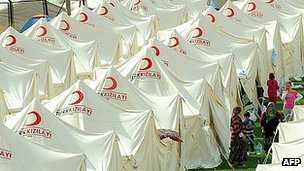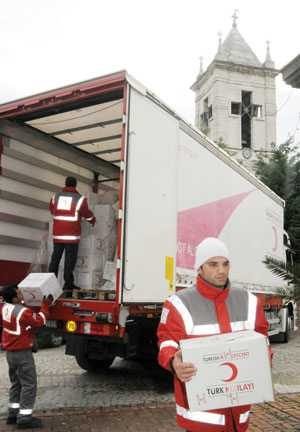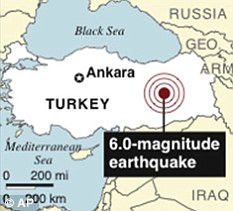Somalia remains a notoriously hard place to help.
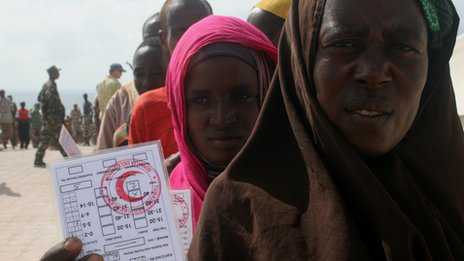
But on a windswept hilltop along the coast a few miles south of the capital, Mogadishu, a giant, almost ludicrously neat, brand new tented camp for displaced families stands as a monument to what foreigners can achieve here with the right approach.
“We’ve had no security problems yet,” said Alper Kucuk, deputy head of the Turkish Red Crescent delegation to Somalia, as we toured the camp surrounded by our own guards and a contingent of soldiers provided by the local administration.
“We have 2,100 tents for 12,000 people. Somalis treat us like their family and we are sure that anyone who has the willingness to do something for them will be very welcome,” said Mr Kucuk.
“Start Quote
The Turkish aid is setting a lot of pace ”
Killian Kleinschmidt UN official in Somalia
Will London conference help Somalia?
In the months since the militant Islamist group, al-Shabab, was finally pushed out of the city by African Union soldiers Turkey has emerged as the most visible foreign presence in Mogadishu – if you discount the green armoured cars belonging to the AU force (Amisom), which still growl their way through the busy streets.
While most foreign organisations remain cooped up at the heavily guarded Amisom base by the airport, some 200 Turkish nationals are now living and working in the city on a variety of projects, ranging from construction to logistics and aid.
“They are our brothers” is a common reaction from Somalis when the Turkish are mentioned.
“While some talk, they act,” was how a man called Aden put it to me.
He said he had recently returned from Canada to help the reconstruction of Somalia.
So why aren’t other countries, or the United Nations, more active, and is it fair to criticise organisations for taking big security precautions, given the number of aid workers who have been killed in Somalia over the years?
“They could do more,” said Mr Kucuk simply.
Boots-on-the-ground approach
Map
The UK’s new ambassador to Somalia, Matt Baugh, still based in neighbouring Kenya, acknowledged that “the Turkish have shown what it is possible to do operationally”.
“They’ve brought a really strong political force to bear. They’re intimately involved – a real force.”
Turkey’s boots-on-the-ground approach is having something of a catalytic effect on the aid community.
“The Turkish aid is setting a lot of pace,” said Killian Kleinschmidt, the UN’s deputy humanitarian co-ordinator in Somalia.
He acknowledged that organisations with Islamic backgrounds “can move better than we can”.
“It’s a constant challenge for all of us to adapt [to the changing security situation],” he said.
“We are now making dramatic steps in recent days to enhance our mobility. Some organisations are slow. Some are faster.”
The humanitarian needs here remain considerable, with hundreds of thousands of people dependent on outside aid and living, in Mr Kleinschmidt’s words, “just above survival”.
The improved security environment in Mogadishu is an opportunity to be seized, but the toughest challenge remains to find ways to reach out to those suffering outside the capital, in areas still under the control of al-Shabab.
via BBC News – Turkey – Somalia aid pioneers?.
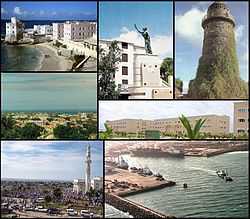 50 construction machines and trucks from Turkey have been brought to Mogadishu to be used during construction activities.
50 construction machines and trucks from Turkey have been brought to Mogadishu to be used during construction activities.

